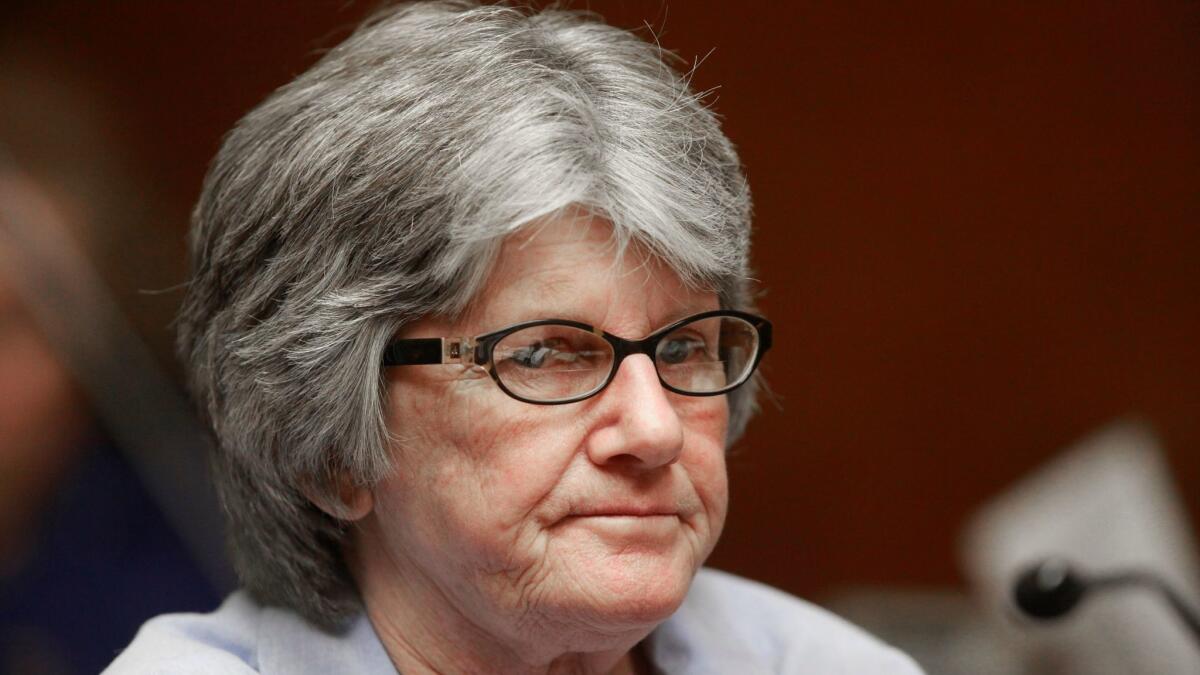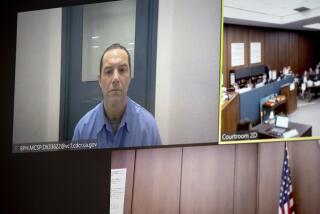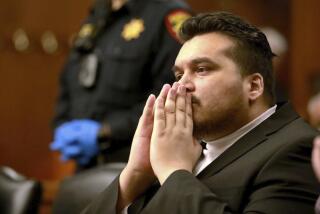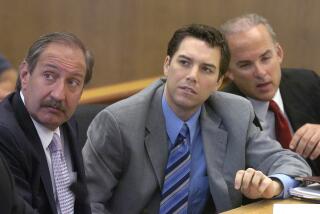Decision on former Manson follower Patricia Krenwinkel’s parole postponed after attorney makes new claims

State parole officials Thursday postponed a decision on setting free Patricia Krenwinkel, a follower of Charles Manson and convicted killer, after the woman’s attorney made new claims that she had been abused by Manson or another person.
The two-person panel from the the Board of Parole Hearings “felt information discussed at the hearing was cause for an investigation,” the California Department of Corrections and Rehabilitation said in a statement.
A source with knowledge of the case, who requested anonymity because the hearing was not public, said Krenwinkel’s attorney, Keith Wattley, raised the notion in his closing statement that his client was a victim of “intimate partner battery.”
The claim, the source said, was akin to battered spouse syndrome, a psychological condition experienced by people who have suffered prolonged physical or emotional abuse by a partner. The syndrome has been used as a legal defense by women charged with killing their husbands.
The inquiry into the allegation is expected to take several months, the source said.
In an email to The Times, Wattley wrote, “I pointed out that there are some things that haven’t fully been investigated (believe it or not). Can’t really elaborate at this time.”
Krenwinkel was sent to death row in 1971 after a Los Angeles jury convicted her of killing actress Sharon Tate and six others in a two-day rampage. The gruesome murders were done at the behest of Manson, who led a cult-like group and envisioned the killings triggering a race war.
After the state’s highest court in 1972 ruled the death penalty unconstitutional, Krenwinkel’s sentence — along with those of other Manson family members — was commuted to life in prison with the possibility of parole.
Thursday’s hearing at the women’s state prison in Corona was Krenwinkel’s 14th appearance before the board, a spokesman for the Department of Corrections and Rehabilitation said.
At her last hearing in 2011, the panel recognized Krenwinkel’s efforts, commending her for a clean disciplinary record, having earned a bachelor’s degree, and her work training service dogs and counseling fellow inmates.
But Commissioner Susan Melanson said the barbarity of the crimes — coupled with Krenwinkel’s failure to fully grasp the global effects of the Manson killings — warranted more time behind bars.
“This crime remains relevant,” Melanson said. “The public is in fear. And that just is a fact of the crime and the consequences of the crime.”
In the lead-up to Thursday’s hearing, Wattley said he was hopeful that the two-member panel would recognize his client’s commitment to examining her offenses and reforming her behavior. He noted that Krenwinkel consistently has been found by medical professionals as posing no danger to society.
“With this case, up to now, it’s been the clearest example of the way in which public outcry can completely eviscerate and override someone’s constitutional rights,” Wattley said before Thursday’s hearing. “Some might say, well, she committed a serious crime like that — you’ve given up your right to fair treatment. Well, that’s not how the law works.”
The delay in making a decision came Thursday night after an all-day hearing. Such hearings, which are held by one of 12 parole commissioners appointed by the governor and a deputy commissioner, are a required step for any inmate seeking parole. At the hearings, the board members and the inmate discuss at length the inmate’s crime, behavior in prison, rehabilitation efforts and psychological evaluation.
Victims and prosecutors from the county where the inmate was convicted are also allowed to address the parole board.
The board must base its decision on whether the inmate would pose a threat to others if released.
If the board ultimately finds Krenwinkel is fit for parole when it reconvenes, whether she walks free or not will still be far from certain.
By law, decisions by the Board of Parole Hearings must be approved by the governor and Gov. Jerry Brown has already rejected the idea of setting another Manson follower free.
In April, a state review board recommended parole for Leslie Van Houten, who had been convicted of murder.
Brown reversed that decision and a Los Angeles County Superior Court judge later upheld the governor’s reversal, saying there was “some evidence” that Van Houten still presented an unreasonable threat.
For more news on federal courts in Southern California, follow me on Twitter: @joelrubin
ALSO
Relatives of girl killed in hit-and-run say she had run away but always called home
Koretz pulls his support for Caruso’s proposed 20-story tower, calling it ‘too tall’
UPDATES:
8:50 p.m.: This story has been updated with new details about how the Board of Parole Hearings makes its decisions.
This story was originally posted at 7:50 p.m.
More to Read
Start your day right
Sign up for Essential California for news, features and recommendations from the L.A. Times and beyond in your inbox six days a week.
You may occasionally receive promotional content from the Los Angeles Times.








